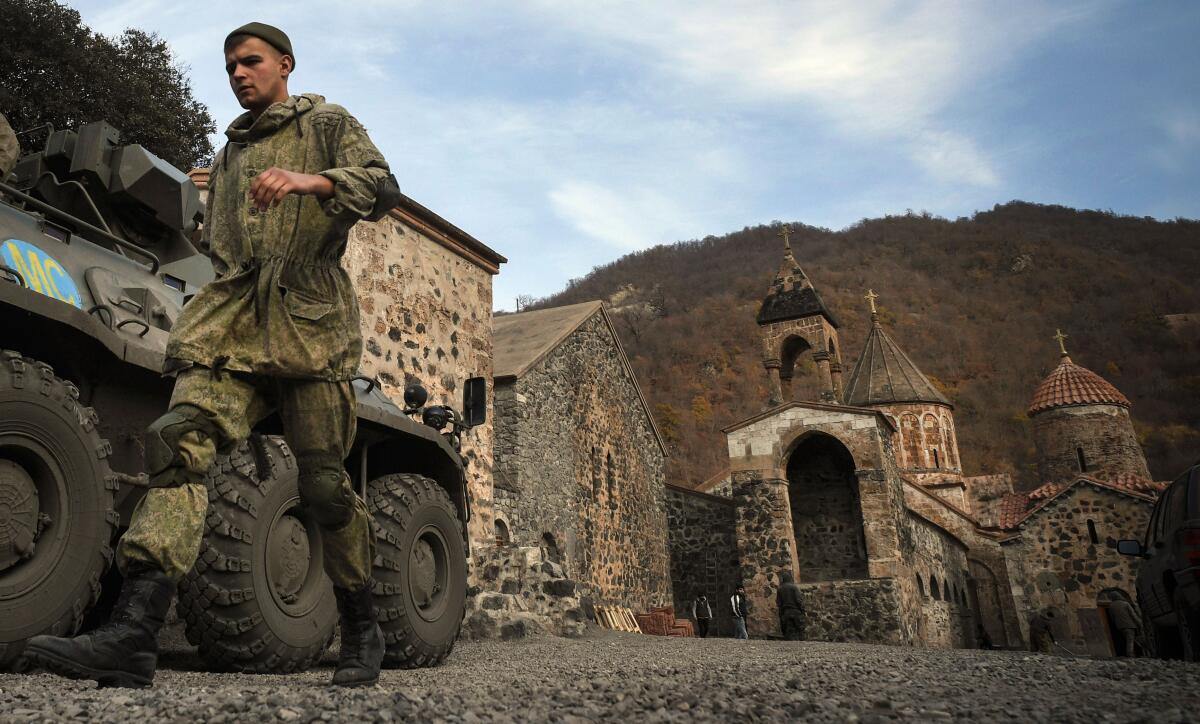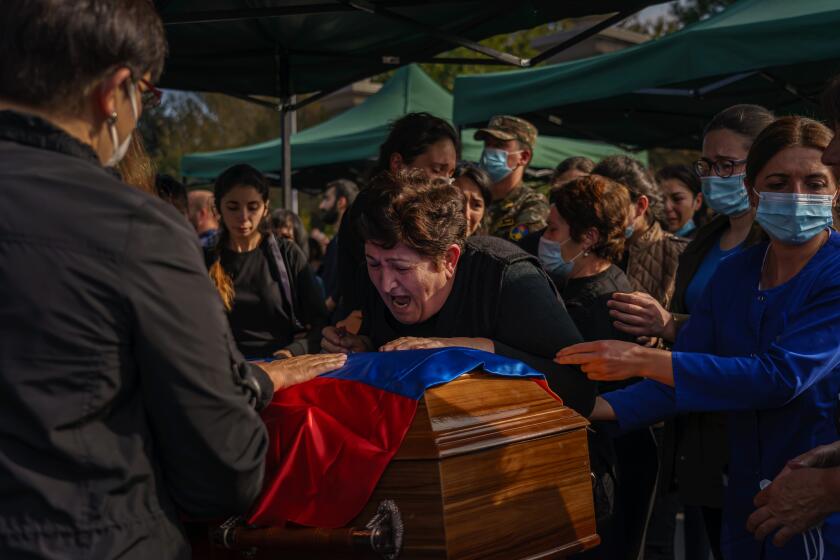Armenia says 49 of its soldiers were killed in overnight attacks by Azerbaijan

YEREVAN, Armenia â Azerbaijani forces shelled Armeniaâs territory in a large-scale attack that killed at least 49 Armenian soldiers and fueled fears of even broader hostilities, officials said Tuesday.
The hostilities erupted minutes after midnight, with Azerbaijani forces unleashing an artillery barrage and drone attacks in many sections of Armenian territory, according to the Armenian Defense Ministry.
The ministry said fighting continued during the day despite Russiaâs attempt to broker a quick cease-fire. It noted that the shelling grew less intense but said Azerbaijani troops still were trying to advance into Armenian territory.
The ministry added that the Azerbaijani shelling damaged civilian infrastructure and also wounded an unspecified number of people.
Azerbaijan said its forces returned fire in response to âlarge-scale provocationsâ by the Armenian military, claiming that Armenian troops planted mines and repeatedly fired on Azerbaijani military positions, resulting in unspecified casualties and damage to military infrastructure.
Azerbaijan and Armenia have been locked in a decades-old conflict over Nagorno-Karabakh, which is part of Azerbaijan but has been under the control of ethnic Armenian forces backed by Armenia since a separatist war there ended in 1994.
Azerbaijan reclaimed broad swaths of Nagorno-Karabakh in a six-week war in 2020 that killed more than 6,600 people and ended with a Russia-brokered peace deal. Moscow, which deployed about 2,000 troops to the region to serve as peacekeepers under the deal, has sought to maintain friendly ties with both ex-Soviet nations.
Azerbaijanâs president, Ilham Aliyev, held a meeting with military officials to discuss the situation. âIt was noted that the responsibility for the current tension rests squarely with the political leadership of Armenia,â his office said.
Azerbaijanâs ally Turkey also placed the blame for the violence on Armenia. Turkish Foreign Minister Mevlut Cavusoglu called for Yerevan to halt its âprovocations,â and Defense Minister Hulusi Akar condemned âArmeniaâs aggressive attitude and provocative actionsâ following talks with their counterparts in Baku, the Azerbaijani capital.
Their decades-old battle over the mountainous territory of Nagorno-Karabakh has come to define how Armenians and Azerbaijanis view themselves.
Speaking in parliament early Tuesday, Armenian Prime Minister Nikol Pashinyan said that Azerbaijani shelling has killed at least 49 Armenian soldiers. He squarely rejected the Azerbaijani claim that it was responding to Armenian provocations.
He said the Azerbaijani action followed his recent European Union-brokered talks in Brussels with Azerbaijani President Ilham Aliyev that revealed what he described as Azerbaijanâs uncompromising stand.
Pashinyan called Russian President Vladimir Putin overnight and also had phone calls with French President Emmanuel Macron, European Council President Charles Michel, Iranian President Ebrahim Raisi and U.S. Secretary of State Antony J. Blinken to discuss the hostilities.
The Armenian government said that it would officially ask Russia for assistance under a friendship treaty between the countries and also appeal to the United Nations and the Collective Security Treaty Organization, a Moscow-dominated security alliance of ex-Soviet nations, including Armenia.
Kremlin spokesman Dmitry Peskov refrained from comment on Yerevanâs request, but added that Putin was âtaking every effort to help de-escalate tensions.â
The Armenian Foreign Ministry said top officials from the security grouping held a meeting to discuss the fighting. Armeniaâs representative emphasized during the meeting that Yerevan expects its allies to take âefficient collective steps to ensure security, territorial integrity and sovereignty of Armenia.â
Russiaâs Foreign Ministry urged both parties âto refrain from further escalation and show restraint.â
Moscow has engaged in a delicate balancing act, maintaining strong economic and security ties with Armenia, which hosts a Russian military base, while also developing close cooperation with oil-rich Azerbaijan.
More to Read
Sign up for Essential California
The most important California stories and recommendations in your inbox every morning.
You may occasionally receive promotional content from the Los Angeles Times.











